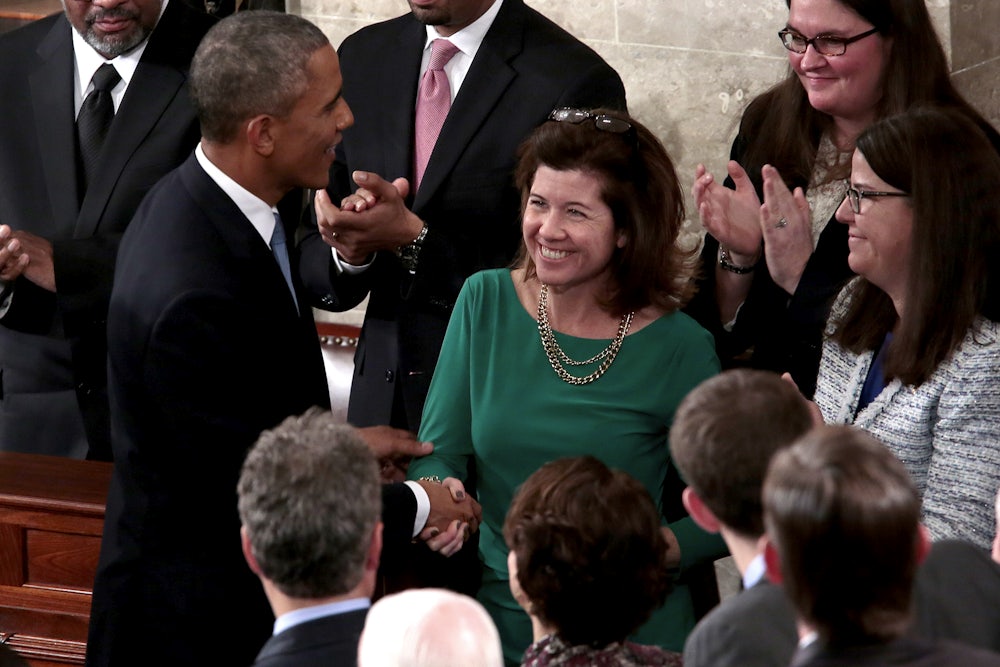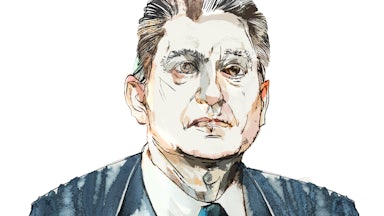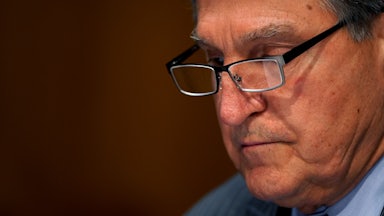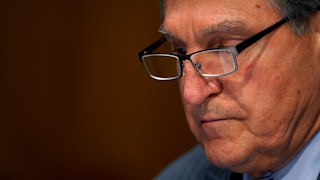When the United States Senate was called into recess on January 6 at 2:13 p.m., Senate Parliamentarian Elizabeth MacDonough stood from her seat behind the dais, adjusted her mask, and looked toward the door where plainclothes policemen were rushing Senator Chuck Grassley to safety. Three mahogany boxes containing the ballots certifying the results of the 2020 election were stacked on a nearby table. To the side, a nervous policeman fidgeted, his hands flitting up toward the gun holstered inside his suit jacket. When the C-SPAN cameras cut away from the scene, those mahogany boxes were still there.
The insurrectionists were already inside the U.S. Capitol. They would soon be on the floor of the Senate. But when they finally entered the chamber and stood behind the dais, the mahogany boxes were gone. It was MacDonough’s staffers who had the presence of mind to get them out of harm’s way. Later, after the melee had ended and the Capitol was cleared of rioters, the boxes and the ballots were returned to their place.
MacDonough did no cable news hits afterward; she didn’t even discuss with the press the matter of keeping the ballots out of the hands of those who were seeking to halt the certification of the election. Much of the reporting around the removal of the boxes failed to credit her or her staff directly. Any other lifelong Capitol Hill occupant would have been on CNN and MSNBC that night. They’d likely be handed a book deal by the next morning. Elizabeth MacDonough just went back to work. Her reticence to stand in the spotlight extends to this article; MacDonough did not respond to The New Republic’s request for comment.
But if MacDonough’s role in preserving the election results eluded attention, the same cannot be said for the work she’s had to undertake since President Joe Biden was sworn in. As the Biden administration has set up shop and a thin Democratic Senate majority has taken up the arduous task of moving the party’s agenda through the warren of the legislature, MacDonough’s role as Senate parliamentarian has garnered a greater share of the media’s attention, and as the key arbiter of Senate rules, she has at times taken criticism from the very Democrats who had reason to be grateful for her professionalism when democracy was hanging in the balance.
During Biden’s first hundred days, MacDonough became a massive figure in the way that only exists in Washington. She ruled in early April that Democrats can pass a second reconciliation bill during 2021; that ruling kick-started a negotiation process that we are still enduring. Biden said in mid-May that he is willing to pass an infrastructure bill without Republican support, though that will still require all Senate Democrats falling in line. The Congressional Hispanic Caucus has also been lobbying Biden to consider passing an infrastructure bill through reconciliation. K Street’s latest cottage industry among lobbyists is specializing in reconciliation legislation, an area that surged in demand following MacDonough’s April ruling.
This week, the mettle of Washington’s reconciliation experts will be newly tested. As Bloomberg’s Erik Wasson reported on Wednesday, the parliamentarian made it clear that Democrats’ second bite of the reconciliation apple will come with some caveats. In her ruling, MacDonough clarified that “to revise a budget resolution, such as the fiscal 2021 resolution used to pass the Covid-19 relief bill in March, the measure must go through committee and have floor amendment votes,” making a revision at least as arduous a task as drawing up a new budget from scratch. Moreover, MacDonough said, any budget revision would have to be justified on the basis of some “new economic downturn.”
For Senate Majority Leader Chuck Schumer, this adds considerable complications to getting an ambitious agenda passed. And it may rekindle some of the anger that Democrats projected in MacDonough’s direction back in February, after she ruled that a raise in the federal minimum wage could not be included in the pandemic relief bill. That decision led to some Democrats calling for her dismissal, while others urged her ruling to be disregarded outright. It’s not often that a Senate parliamentarian is the target of such frustration or fury; rarer still to see one lose their job for doing their duty. Suddenly, however, MacDonough had become something that she otherwise seems to prefer to avoid being: interesting.
MacDonough is one of the most powerful lawyers in the country, imbued with the power to make rulings that have sweeping consequences for the entire country. The senators and colleagues who know her best, however, describe MacDonough as one of the most personable people in Washington. Senators from both parties frequently approach the dais to have short conversations with her, exchanging fist-bumps over the desk. The bipartisan support MacDonough enjoys is stunning in the current political era. As Senator Ted Cruz told The New Republic, “She’s got a lot of experience and credibility. There have been times when Republicans have been unhappy with her rulings, there have been times when Democrats have been unhappy with her rulings. That’s probably a good sign for a parliamentarian.” Senator Elizabeth Warren echoed those remarks, saying, “I think she takes her cues from an umpire in a baseball game. She calls it the way she sees it regardless of what other noise is going on in the stadium.” A decade into the Tea Party era of partisanship-at-all-costs, MacDonough may be the only truly nonpartisan creature of Washington.

She may also be one of the few Beltway elites to truly demonstrate a common touch, as well. Her predecessor, Alan Fruman, told The New Republic that MacDonough has gone out of her way to get to know those who toil at Capitol Hill’s forgotten tasks. “She knows service people that most of the other people don’t pay attention to,” Fruman said. “She knows the cops, she knew [fallen Capitol Hill police officer] Billy Evans. She knows the janitors, she knows the plainclothes cops, she knows the people who have been there for a long time cleaning dishes, and she’s got a kind word for everybody.”
In a way, MacDonough has something in common with those who work behind the scenes to keep Congress functioning: She, too, is an invisible but major part of not only the Senate process but the Senate itself. The Senate parliamentarian serves as the umpire of the upper chamber. When a senator files a bill, MacDonough decides which committee will handle it. That process can be intense: Senators expect a quick turnaround, and they are often territorial of their committees.
When the majority party in the Senate works to pass its annual budget reconciliation bill, it’s MacDonough’s job to decide whether the provisions in the bill follow what’s become known as the Byrd Rule. Named after the late Senator Robert Byrd, whom MacDonough worked alongside when she was a young aide in the parliamentarian’s office, this piece of procedural arcana dictates that any policies that are packed into any reconciliation bill cannot affect the federal budget in a “merely incidental” manner. Democrats have increasingly sought to use the budget reconciliation process to advance their agenda because it allows them to advance bills by a simple majority vote, thus bypassing the filibuster’s supermajority requirements. Democrats had hoped to pass a federal minimum wage increase in their pandemic relief bill in this fashion; MacDonough ruled that this violated the Byrd Rule.
Her decision proved to be provocative, with several Democrats, understandably frustrated at having their designs to raise wages thwarted by the Senate’s ref, lashing out. Congresswoman Ilhan Omar tweeted, “Replace the parliamentarian.” Her colleague Ro Khanna called on Vice President Kamala Harris to overrule MacDonough’s decision. But lawmakers rarely accede to such demands. The last time a vice president overruled the Senate parliamentarian was Nelson Rockefeller in 1975. In 2001, Republicans fired Senate Parliamentarian Robert Dove, their frustrations with rulings that blocked the passage of President George W. Bush’s proposed tax cuts finally boiling over.
Harris, of course, did not overrule MacDonough. Senator Bernie Sanders pushed a vote to overrule MacDonough, but seven Democrats voted with Republicans to abide by the parliamentarian’s ruling.
As Representative Alexandria Ocasio-Cortez told The New Republic, the lion’s share of the animus was not directed at MacDonough personally: “It’s less the parliamentarian: It’s frustration with the Byrd Rule; it’s frustration with the upholding of these rules; it’s frustration with the filibuster; it’s frustration with the lack of leadership among certain Senate Democrats that are holding this entire country back.” In the end, White House Press Secretary Jen Psaki said that President Biden “respects the parliamentarian’s decision and the Senate’s process.” Everyone would live to fight another day.
Like many other Beltway denizens, MacDonough received her undergraduate degree from George Washington University—her LinkedIn entry lists her major as English literature. She spent a few years as an aide in various parts of the Senate before enrolling in law school at the University of Vermont, which was then a top program for environmental law. A law school colleague told The New Republic, “She was always very put-together, not only prepared—I never saw her stumble an answer.”
MacDonough returned to the University of Vermont in 2018 to deliver the commencement speech at the law school graduation. She advised the graduates: “You have to laugh, there is so much that is pressing and serious that you must find some humor in your work.” Her own sharp sense of humor is frequently commented upon; she’s particularly well known for her spot-on Bernie Sanders impression. As one friend of hers mused, “She could probably get Sanders’s office staff on the phone and either fire or promote the whole bunch, and they would think it came from the boss.”
MacDonough’s career has been fairly action packed, as both parties have enacted major legislation during her quiet but influential tenure. In 2017, she ruled that Republicans could not include a provision cutting federal funding to Planned Parenthood in their Obamacare repeal bill because the provision violated the Byrd Rule. And in April of this year, she ruled that Democrats would be permitted to pass two reconciliation bills in 2021, a shift from previous interpretations of the rules dictating that only one reconciliation bill can be passed each year. This is perhaps her most consequential decision yet: Republicans fired Robert Dove in part because he refused to budge on the traditional limit of one budget reconciliation bill per fiscal year.
MacDonough was attending a reception when Dove got the ax, and was called back to the office by Frumin, who ascended to the role of parliamentarian with Dove’s ouster. “It’s just you and me,” Frumin told her, “and you have no idea how much work and responsibility I’m going to give you.” Frumin tells The New Republic that MacDonough responded, “Bring it on.”
Her entire life after college was aimed at a career public service post. She worked at nonpartisan roles within the Senate before going to Vermont Law, where many of her law school classmates went on to work for organizations like the Environmental Protection Agency or the National Oceanic and Atmospheric Administration. Frumin tells me that “he found applying [his] law degree to government service far more interesting than applying it in the commercial realm, despite the lower level of compensation.” Asked why MacDonough may have wanted to take on such a consequential but underpaid job, he told me, “So that she can spend her career doing an honorable and significant job in an honorable and nationally significant institution. There wasn’t a day that I went to work at the Senate doubting the value of the work I was doing, and the respect of doing it honorably.”
A few months after MacDonough was promoted to the No. 2 job in the Senate parliamentarian’s office, two planes crashed into the World Trade Center in New York City, and Washington immediately became a different place. MacDonough took on a disaster-planning role, which included preparing alternate meeting locations for the Senate during a national crisis. She was also heavily involved in meetings where Senate offices put together their “fly-away” kits, which would be needed if senators were fleeing the Capitol. Twenty years later, lawmakers reached for those very kits as they fled the floor of the Senate from insurrectionists storming the Capitol, as MacDonough directed her staffers to rescue the ballots certifying the 2020 election. She also likely personally saved the state of Arizona’s ballot, which would have been on her desk, as the Senate was debating the legitimacy of the election in Arizona at the moment lawmakers had to hastily abandon their posts. The senators themselves didn’t have the foresight to take their own documents—there are videos of insurrectionists rifling through the papers on their desks as they ran riot through the chamber.
Frumin told me he wasn’t surprised by the way MacDonough handled herself during the insurrection. “She’s much more aware of her world in every iteration than almost anybody that I know,” he said. Most Americans aren’t aware of the role she played that day: A viral photo misidentified the women who saved the ballots, and that may stand as fact in the unconscious memory of the nation. MacDonough and her staff conducted no press tour setting the record straight. To date, there hasn’t even been a comment from the Senate parliamentarian’s office clarifying the matter. As after 9/11, the government went back to work. And while many things are different now, MacDonough’s quiet presence on the floor of the Senate is not one of them. She’s still there.








